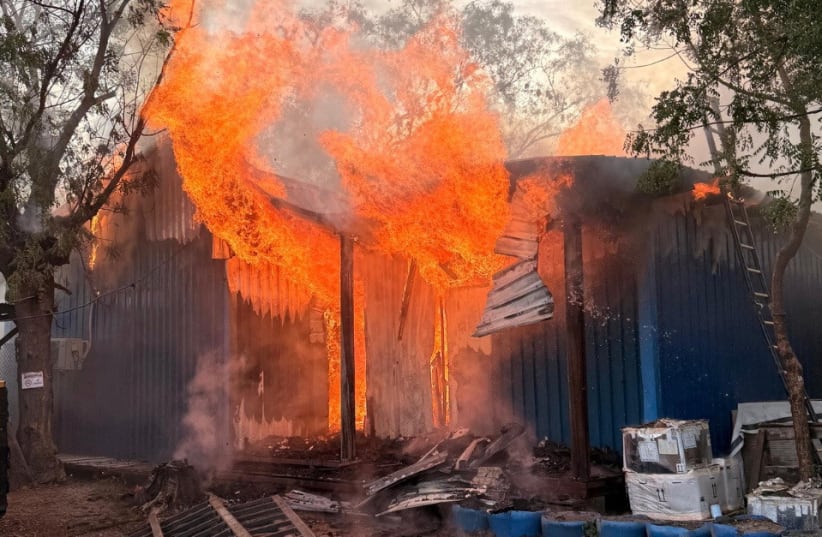The UN Commission on Human Rights in South Sudan on Tuesday strongly condemned the deliberate aerial bombardment of a Médecins Sans Frontières (MSF) hospital in Old Fangak, Jonglei State.
A statement extended to Radio Tamazuj said the act is an atrocity crime that may constitute a grave breach of international humanitarian law and a war crime.
“The early morning airstrike on Saturday, 3 May 2025, obliterated the hospital, killing at least seven civilians and injuring many, including patients, caregivers, and medical staff,” the statement reads in part. “The attack destroyed critical medical infrastructure, and the hospital’s pharmacy, cutting off tens of thousands from critical lifesaving care.
According to the Commission, credible reports confirm further aerial bombardments in the Phom area of New Fangak in the early hours of 5 May 2025, where bombs reportedly fell between an INGO compound and the County Commissioner’s office.
“This was not a tragic accident. It was a calculated, unlawful attack on a protected medical facility. The aerial bombing of the MSF hospital in Old Fangak is a flagrant war crime, under international law,” said Yasmin Sooka, Chair of the Commission. “Targeting medical facilities and services violates the Geneva Conventions and represents a direct assault on foundations of humanitarian action that are intended to protect civilians in conflict zones. Those responsible must be identified, investigated and held accountable without delay.”
The attack followed a public statement by the spokesperson of the South Sudan People’s Defense Forces (SSPDF) on Friday, 2 May 2025, ordering retaliatory military action if hijacked vessels at Adok Port in Leer County were not immediately released by armed elements. The SSPDF warned that failure to comply would result in punitive aerial and riverine operations. This threat was issued shortly after the Government, in a strategic public announcement, categorized Nuer-majority counties by ethnicity into ‘hostile’ and ‘friendly’—naming Fangak, home to tens of thousands of Nuer civilians, as one of nine ‘hostile’ counties in its document titled The Strategic Response of the Revitalized Transitional Government of National Unity (R-TGoNU) to the Nasir Incident.
“This strike does not seem to be an isolated incident—it occurred in the context of escalating ethnic profiling, unlawful detentions, and a hardening of positions within the political and military elite,” said Commissioner Barney Afako. “Designating the entire community of Fangak as hostile is deeply irresponsible and may amount to incitement of reprisals and collective punishment. This practice must end, and such designations must be rescinded immediately.”
The MSF hospital was the only major medical facility serving more than 40,000 people in the Old Fangak area. MSF confirmed the complete destruction of the hospital and medical supplies in the attack, which has deprived an already vulnerable population—displaced and traumatized by conflict—of emergency care, maternal health services.
“The targeting of medical facilities is not only unlawful – it is inhumane,” said Commissioner Carlos Castresana Fernández. “Hospitals must be protected spaces, not battlegrounds. What happened in Old Fangak is symptomatic of a growing impunity and disregard for human life that must be urgently addressed.”
The escalation in political tensions and violence in South Sudan poses a direct threat to the viability of South Sudan’s transition and jeopardises the implementation of the Revitalized Peace Agreement.
“The Commission urges the visiting delegations of the African Union Commission (AUC) and IGAD to press for the protection of civilians, and for accountability, and to urge signatories to the Agreement to return to political dialogue as the only means of addressing differences,” the statement said. “The presence of AUC and IGAD in Juba should serve as a catalyst for urgent, high-level political engagement to urge all parties to return to dialogue and find their way back to implementing the Revitalized Agreement.”
The Commission further warns that repeated violations of the cessation of hostilities is driving the country dangerously close to another nationwide conflict.
“The path South Sudan is currently on is perilous,” Sooka warned. “If attacks like these continue with impunity, the Peace Agreement risks becoming meaningless. The AU, IGAD and the international community must respond decisively.”




